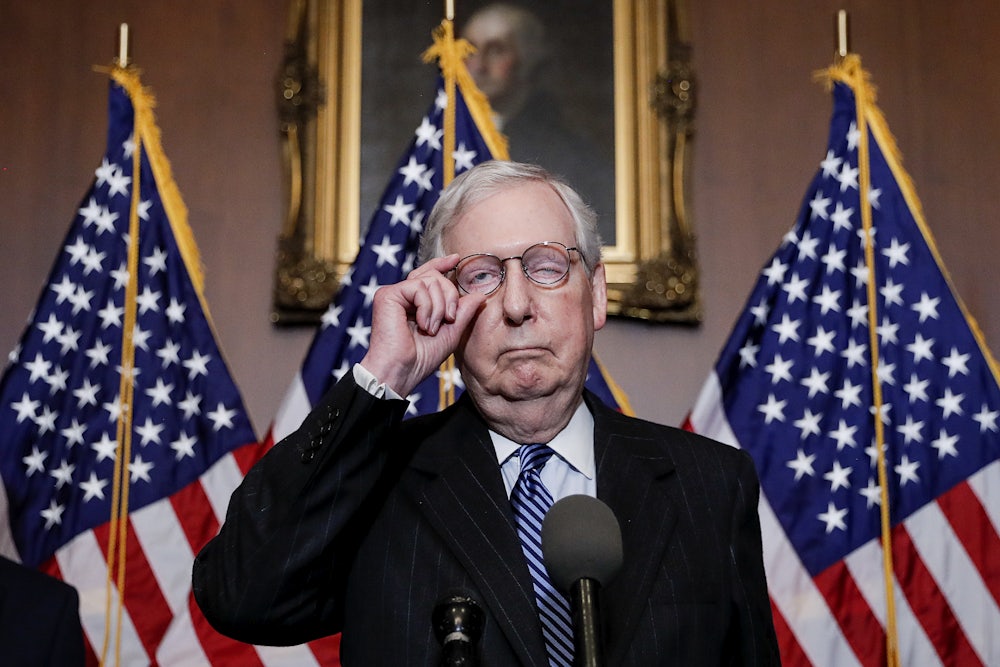The
disgraceful performance by the Senate Republicans at the confirmation hearings
of Judge Ketanji Jackson shows that they pose a continuing threat to the mutual
respect, civil discourse, and good faith that are essential to the working of
our democracy. Senators Mitch McConnell, Lindsey Graham, Josh Hawley, and Ted
Cruz are obviously unrepentant for the near-death experience that they put our
democracy through by failing to check Donald Trump’s abuses of power.
Make no mistake: the Senate’s performance during the Trump presidency is the story of the most catastrophic failure of government in American history. That failure undermined the rule of law and threatened our constitutional rights. It deepened our divisions, pitting red states against blue states, whites against Blacks. It endangered our national security, weakening our alliances and strengthening our adversaries. It caused many thousands of Americans to die needlessly before their time. It led directly to the insurrection at the Capitol.
Most American history is written about the presidents—Washington, Jefferson, Lincoln, the Roosevelts, Kennedy, Johnson, Nixon, Reagan—or great events like the American Revolution, the Civil War, the Depression, World War II, Vietnam. Donald Trump’s aberrational presidency has already been the subject of more than 1,200 books; at least 1,200 more will emerge in the years to come. People here and around the world will ask how America, the greatest power in the world, elevated to the presidency a celebrity reality TV star with no experience in government, whose tumultuous business record, deeply flawed personality, abuse of women, and hatred of minorities were all plainly visible.
But in the American constitutional system, no one person—not even a president—should be able to undermine our institutions and jeopardize our democracy. The framers of the Constitution wanted a strong central government because the weakness of the Articles of Confederation showed the limits of what the states could accomplish on their own. But having fought the American Revolution to free the colonies from Great Britain and its monarch, our founders feared the possibility of an overreaching executive who would seek to become a king or an autocrat. They also feared that a president might be corrupt, pursuing personal gain instead of the national interest, and that he could be susceptible to powerful foreign influences.
Consequently, the founders designed a system of checks and balances, the most distinctive feature of which was the Senate. They made it the strongest upper house in the world, with the power to “advise and consent” on executive and judicial nominations, to ratify treaties, and to hold impeachment trials. James Madison, in a letter to Thomas Jefferson in 1787, called the Senate “the great anchor of the government.… Such an institution may be sometimes necessary as a defense to the people against their own temporary errors and delusions.”
The Senate would be assigned many functions, but it had one fundamental responsibility: to be a bulwark against any leader who would abuse the great powers of the presidency in ways that threatened our democracy. Some 230 years later, when just such a president finally reached the White House, the Senate should have been democracy’s strongest line of defense. Instead, a nightmare scenario followed: the Senate, weakened from a long period of accelerating decline, proved utterly incapable of checking Trump’s authoritarian desires. Sometimes the Senate Republican majority aided and abetted Trump; often it simply stood by and allowed him to rampage unchecked. America had no defense against the novel threat presented by the unholy alliance between Trump and the Senate Republican leader, Mitch McConnell. Speaker of the House Nancy Pelosi, in a moment of anger, correctly observed that the founders had not contemplated the combination of “a rogue president and a rogue majority leader.”
The magnitude of the Senate’s failure should be clearly understood. The Senate did not fail because of its arcane rules or because of the abuse of the filibuster. It wasn’t because its members lacked the ability to do their jobs. Nor did it fail because the senators missed the danger signs. The overwhelming majority of the Senate knew that Trump was incompetent, corrupt, and dangerous; indeed, many saw him as a witting or unwitting agent of Vladimir Putin.
No, the Senate failed because its Republican members, led by McConnell, abandoned the late Senator John McCain’s guiding principle: “Country first.” When it mattered most, the Republican senators put their personal political interests first, the Republican Party’s interests second, and country’s interests nowhere. As America faced unprecedented, cascading, intersecting crises, the Republican senators chose to stand with Trump, either actively supporting him or silently acquiescing. Some undoubtedly convinced themselves that Trump would wither away or that they would find an exit ramp. But as George Ball, the State Department official who famously dissented from the escalation of the Vietnam War, observed: “He who rides the tiger cannot choose where he dismounts.”
There is a familiar Sicilian proverb, “A fish rots from the head.” The story of the Senate’s rot is first and foremost the story of Mitch McConnell. He was an unyielding obstructionist during the Obama presidency, culminating in his refusal to hold a vote on Obama’s Supreme Court nominee Merrick Garland following the death of Justice Antonin Scalia in February 2016. In contrast, McConnell became a relentless battering ram with Trump in the White House. He rode roughshod over one Senate custom, norm, and tradition after another. After Trump shocked the world by winning the presidency, America urgently needed a strong Senate, with a leader in the mold of Democrat Mike Mansfield or Republican Howard Baker, politicians who are rightly remembered as great statesmen and patriots. Instead, America got McConnell, a superb political strategist and tactician who was extraordinarily effective in achieving his partisan objectives, at great cost to the Senate and the country that depended on it.
Of course, even McConnell, the most powerful Senate leader in history, could not have done what he did without his troops. Throughout the Trump presidency, McConnell had only a very narrow majority with which to work. At any moment, three or four Republicans could have stopped him in his tracks. This happened exactly once, in July 2017, when John McCain, dying of brain cancer, memorably joined Susan Collins and Lisa Murkowski in defeating McConnell’s brazen attempt to repeal the Affordable Care Act without hearings, committee action, or floor debate.
Just as McConnell enabled Trump, the other Senate Republicans enabled McConnell. Except for Mitt Romney, who cast the only Republican vote to remove Trump from office in the first impeachment trial, all the Republican senators were complicit. The shameless Lindsey Graham, who had been John McCain’s best friend and Donald Trump’s most scathing critic, spun 180 degrees to become Trump’s favorite golf partner and McConnell’s wing man. Less verbose and simply shameful, Lamar Alexander and Rob Portman, two once-superb public servants, allowed themselves to become virtually invisible at every moment when their voices and their stature would have been useful to call attention to Trump’s abuses of the presidential office.
In the crisis year of 2020, one of the darkest in American history, McConnell and his Republican caucus exonerated Trump after his first impeachment despite uncontroverted evidence that he withheld military assistance from Ukraine to benefit his presidential campaign by damaging Joe Biden, his strongest potential opponent. They averted their eyes as Trump lied about Covid-19, hawked fake cures for the virus, attacked blue state governors, and mocked masks and social distancing—a deluge of misinformation that caused thousands of needless deaths. They opted for silence when Trump invited his supporters to indoor rallies at the peak of the pandemic. They allowed Trump’s “Big Lie” that the election was stolen to poison the thinking of 70 percent of his voters—roughly 50 million Americans. They roused themselves to action only long enough to ram through the confirmation of Judge Amy Coney Barrett to the Supreme Court eight days before Election Day. A dozen of them refused to certify the Electoral College results, providing an opportunity for the January 6 assault on the Capitol. The Senate’s Republican members did not just fail; they betrayed their oaths of office, sacrificing American lives and American democracy.
America has paid a terrible price for the experiment with Trump, a narcissistic outsider and disrupter, with authoritarian impulses and contempt for our democratic institutions. But it is McConnell, the political stalwart and faux institutionalist, who poisoned and undermined our political system from within, transforming the Senate into a hyper-partisan battle zone, draining it of the trust and pride that made it work in its great days, while using it for his own purposes. Years before Donald Trump became president, we were living in Mitch McConnell’s America; even with Joe Biden in the White House, to a greater extent than might have been anticipated, we still are.
Midterm elections pose an enormous challenge for the party that holds the White House, but the Democrats have a favorable map for the 2022 Senate elections. A Senate with 53 or 55 Democrats, instead of the current 50, would bring about a sea change in American politics. In a time of crisis and uncertainty, we can be sure of one thing. America will not have a decent politics or a functioning government unless the power of Mitch McConnell and the Senate Republicans is sharply reduced. They must be held accountable for their past failures and prevented from inflicting any more harm.
This essay is adapted from The Betrayal: How Mitch McConnell
and the Senate Republicans Abandoned America, to be released May 17.
Reprinted by permission of Rowman & Littlefield Publishers, Inc.








